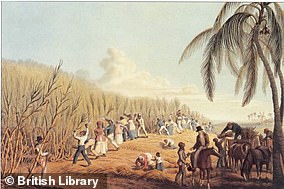The Sugar Revolution, the introduction of sugar cane from Dutch Brazil, in the 1640s was highly lucrative but came at great social cost
Barbados was one of the oldest English settlements in the West Indies, being surpassed only by Saint Kitts.
The country’s historical ties date back to the 17th century and involve settlement, post-colonialism and modern bilateral relations.
Since Barbados gained its independence in 1966, the nations have continued to share ties through the Commonwealth, with the Queen as Monarch.
In 1627, 80 Englishmen aboard the William and John landed on the Caribbean island and founded Jamestown (close to today’s Holetown), in the name of King James I.
The early settlers struggled to develop a profitable export crop and faced difficulties in maintaining supplies from Europe.
However, the Sugar Revolution, the introduction of sugar cane from Dutch Brazil, in the 1640s was highly lucrative and over the next decade more than two thirds of English emigres to the Americas went to Barbados.
But while this shift to sugar yielded huge profits, it came at a great social cost. Thousands of West African slaves were shipped across the Atlantic to work the plantations.
The sale of sugar, or white gold as the colonists called it, reaped huge profits because it was a scarce commodity in European markets.
Sugar continued as an integral part of the country’s economy into the 19th century, while workers suffered from low wages and minimal social services.
Barbados became independent on November 30, 1966, during a time when the country’s economy was expanding and diversifying.
In 2008, British exports to Barbados stood at £38.0 million, making it Britain’s fourth-largest export market in the region.
In recent years a growing number of British nationals have been relocating to Barbados to live, with polls showing that British nationals make up 75–85 per cent of the Barbados second home market.
